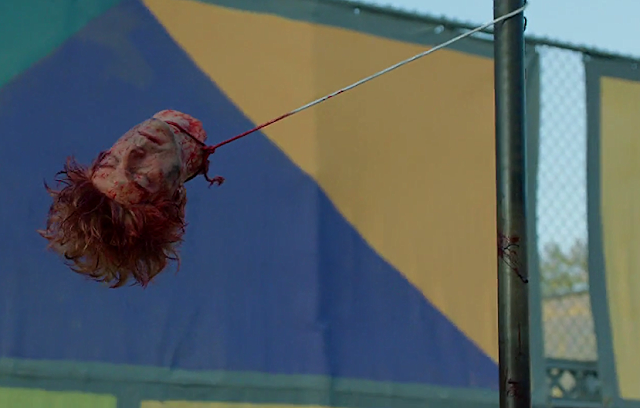
Cooties is one of those films that, as you're watching it, you almost start to dislike just because you want it to be better than it is. And that's not to say Cooties isn't good, or very funny, because it is, but it's because the film was nearly there - immortal status - that it starts to suffer for it. The cast have remarkable chemistry, each providing a dose of their own real personalities (the reason they were cast in the first place), with Rainn Wilson's Wade playing an even more exaggerated version of Dwight from The Office, while Elijah Wood gets to show off his rarely seen comedic chops beyond Wilfred, where he generally plays the straight man, anyway. (Him telling his students to read pages from his unpublished manuscript as he sits down, closes his eyes, and places his hands over his smiling mouth, as if he wants to take it all in and bask in the inevitable appreciation of his elementary school students, is unexpectedly hilarious.)
Much like any horror-comedy, or any comedy in general, some jokes land and some don't, but the ones that do are frequently funny. Co-writer Leigh Whannell (screenwriter for the Saw and Insidious series) absolutely steals the show as Doug, the socially awkward and possibly serial-killing biology teacher who rattles off all the film's best lines (especially during the Breakfast Club-ish confessional scene).

Directors Jonathan Milott and Cary Murnion, in the midst of all the carnage, manage to show off some pretty striking directorial flare, most notably in the slow-motion sequence somewhat reminiscent of another zombie opus, World War Z, in which the audience gets a ground-zero look at how quickly the zombie virus can spread, when a zombified student tears across the playground scratching deep wounds into the arms of other students. The surreal but savage and brutal construction of this sequence, despite it taking place in a cheeky black comedy, wouldn't feel out of place in a more traditional horror film. The tremendous musical score by Bulgarian composer Kreng marries bits of John Carpenter to traditional orchestra and sounds fantastic.
Where the film fumbles is with its use of Jorge Garcia as an acid-dropping crossing guard who spends most of the film isolated in a van hallucinating from the drugs he's taken. While this does mostly come off as entertaining, it also feels like it belongs entirely to its own story; it could have been fully excised without affecting the film, even improving its pace. Cooties also falls victim to a Return of the King-ish too many endings. Once the film embarks on a change of location during the third act (and following a dispatching of a certain character), Cooties feels like it's just around the corner from ending, but when it insists on continuing, it starts to feel dangerously close like overstaying its welcome.

Not since Troma's terrible Beware: Children at Play has a film so unashamedly both put children in danger and made them the adversaries, and thankfully Cooties, despite its very recognizable cast and mainstream release, doesn't relent when it comes to bloodletting and bodily carnage. The nice thing about Cooties is that, unlike Beware: Children at Play (or anything from Troma), you get all the mayhem with none of the desire to take an immediate shower.
Though the zombie comedy thing has been done to death, Cooties proves that there's still life in the concept yet. It boasts an engaging and amusing story, more good jokes than bad, and a cast whose chemistry is infectious makes Cooties worth catching.








